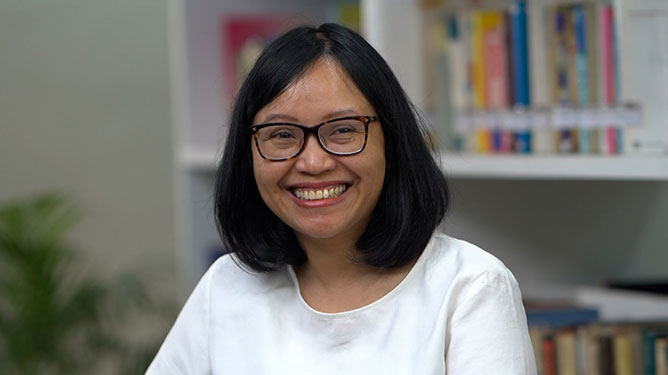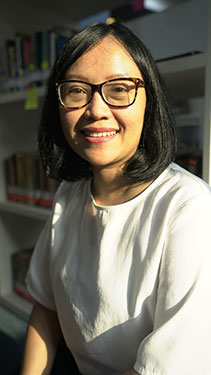JICA Interviewee profile
Name: Lintang Paramitasari Parnohadiningrat Wibawa
Country of Origin: Indonesia
Title and Organization: Director for the Junior Diplomatic Training, Ministry of Foreign Affairs
JICA Course: SDGs Global Leader 2017-2019,
Ph.D. GRIPS Global Governance Program (G-Cube)
Research Area/Theme: Trade Policy, Trade Agreements
Lintang Paramitasari Parnohadiningrat Wibawa, who works at the Ministry of Foreign Affairs in Indonesia as a Director for the Junior Diplomatic Training, speaks about the time she spent conducting research at the National Graduate Institute for Policy Studies (GRIPS) in Japan.

How She Got to Know About JICA
Lintang Paramitasari Parnohadiningrat Wibawa has been working as a civil servant at Indonesia's Ministry of Foreign Affairs since 2003. While working in the policy space related to trade and investment, she decided to pursue a PhD in Japan.
She learned about GRIPS from an alumnus who works at the Ministry of Foreign Affairs. As she looked into the programs that GRIPS offered, she knew that the GRIPS Global Governance Program (G-Cube program) would suit her capacity development needs as a professional in the field of public policy and foreign policy.
Through her research, she investigated the utilization of free trade agreement, mainly the Indonesia-Japan Economic Partnership Agreement, the first bilateral trade agreement that Indonesia has had with any other country.
Why She Studied Abroad in Japan
“Because my husband, who works as a diplomat at the Ministry of Foreign Affairs, was getting posted to Japan, I decided to find a scholarship for a PhD there,” says Lintang while talking about her experiences. Lintang feels that one of the most enriching aspects of her stay in Japan was gaining new insights into Japan's trade agricultural policies.
“I believe that studying in Japan gives you a different perspective on how things work, one that is similar to how we try to see development. This is not always the case when studying in other developed countries. I think I have a better understanding now of why Japan has a unique agricultural policy,” she notes.
Turning point — Meeting the Professor at GRIPS
Lintang was enrolled in a different scholarship before she learnt about JICA. “Dr. KITAOKA Shinichi, Former President of JICA (2015-2022), was a Professor at the G-Cube program. He explained to the students of GRIPS about the opportunity to join the scholarship, and I was one of them,” says Lintang, recollecting the unique circumstances that led to her getting the SDGs Global Leader for 2017-2019 scholarship.
How the JICA Program Changed her Career
“The amazing thing about the Ministry’s internal regulation is that once we return with a PhD, we automatically get promoted. This, I believe, does not apply to other Ministries in Indonesia. When it comes to doing research, I have friends who are probably much more successful or intelligent than me. However, when they returned to their Ministries, they were not promoted because the rules are different. But when I returned home, I was offered a promotion at the Ministry of Foreign Affairs,” Lintang tells us.
After completing her PhD tenure under the JICA program, Lintang was granted an acceleration on her diplomatic as well as civil service ranks. This opened up opportunities to bid for a directorship level, and she was encouraged to take up the position of Director of the Junior Diplomatic School. “It had nothing to do with my research, but I believe I brought many of the practices in terms of teaching, engaging students, and connecting Japanese knowledge to Indonesian young diplomats,” Lintang continues.

Taking Back Her Learnings to Her Home Country
Lintang tell us how she learned a lot from the Japanese development model and believes that other countries can learn from Japan as well. For example, Japan was the first country to establish the Regional Supply Chain in South East Asia. She also believes that studying in Japan has helped her understand how globalization and regionalization work more effectively. It has provided her with new perspective, including on how she views, thinks, and even solves problems.
“A really important finding of my PhD study relates to the crucial role of the ‘rules of origin’ in shaping Japan's trade policies. The rules of origin stipulate that before providing tariff discounts to another country for importing their products, we have to make sure that the product being exported by that country is actually made in that country,” Lintang explains.
“Currently, Indonesia is negotiating some trade agreements with other countries, and my colleagues often invite me to share some of my findings from my time in Japan,” says Lintang.
JICA's Role in Advancing SDGs
Lintang thinks that Sustainable Development Goals (SDGs) should continue to be at the heart of JICA’s mission to empower young talent. “I think achieving the sustainable development goals is important to many countries right now. So, I think JICA's efforts in this direction can be continued and should be sustainable for the future,” she observes.
“I believe that both Japan and Indonesia face common challenges as neighbors as well as development partners, and that there is always room for us to collaborate in order to ensure that the region in which we live, remains stable and prosperous. JICA has an important role to play here,” she adds.
Trust in JICA
Lintang believes that the JICA scholarship is a great opportunity for students in Indonesia and that the program can contribute to strengthening the ties between her home country and Japan.
“As a JICA alumnus, I always count on JICA to support my students. I think the best way of engagement is connecting people and that's what JICA has been doing with its work. I encouraged one of my juniors at the Ministry of Foreign Affairs to apply for the JICA scholarship. She is very bright, and this is a good way for me to show the Ministry of Foreign Affairs that JICA can do many good things,” she concludes.




scroll